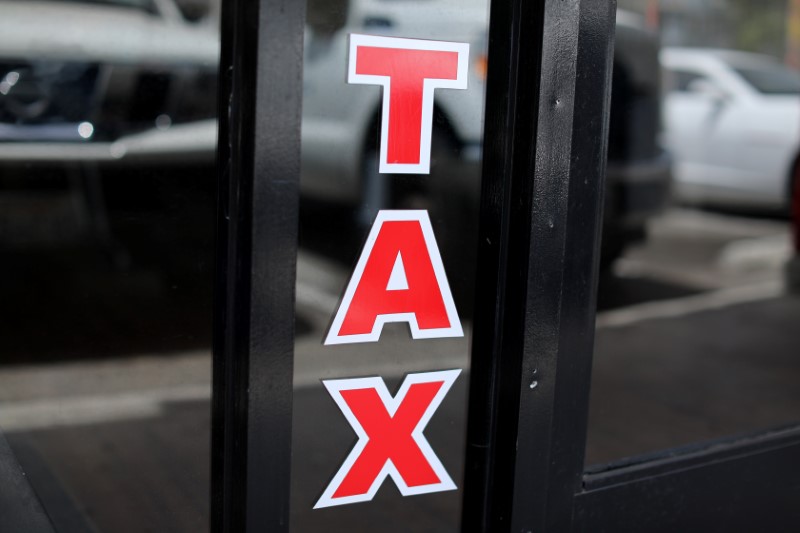By Mark Miller
CHICAGO (Reuters) - Greetings from Illinois, a state that never tops the rankings of places to retire. We have one of the great American cities, but also polar vortexes and an enormous state budget deficit - and now there is renewed talk about taxing retirement income to help close the gap.
Illinois is one of the few states that have an income tax but do not tax any retirement income. Two leading business groups recently renewed their calls to change that as part of broader, desperately needed fiscal reforms. The ensuing debate casts a spotlight on an important national conversation about how states should tax retirement income, if at all.
The federal government taxes income from tax-deferred retirement accounts, but Social Security benefits for lower-income retirees are exempt. And taxpayers over age 65 also can take an extra deduction of $1,300 (joint filers) or $1,600 (single filers).
But the policies of various states are all over the map. Data provided by the Institute on Taxation and Economic Policy shows that 11 states tax some portion of Social Security benefits, usually mirroring the federal formula. Many others tax pensions and tax-deferred accounts, although some have exemptions that protect lower-income, public sector workers and military personnel.
Aside from Illinois, just two other states that levy income taxes exempt all retirement income: Mississippi and Pennsylvania.
PRESSING ISSUE
The policy of exempting retirement income dates to a time when elderly poverty rates were much higher than they are today. As recently as 1970, almost 25 percent of Americans older than 65 lived in poverty, according to the Census Bureau; now it is around 9 percent. The federal government did not tax Social Security until the 1980s.
Protecting vulnerable low- and moderate-income retirees remains an important goal, but blanket exemptions make no sense from a tax policy standpoint. “Almost any economist will tell you that we should treat all income equally,” said Don Boyd, co-director of the State and Local Government Finance Project at Rockefeller College at the University at Albany, State University of New York. “If you have $50,000 of income, it doesn’t matter if it is from a pension, dividends or wages - tax law generally doesn’t make too many distinctions.”
Taxing retirement income will be a more pressing issue as the country ages, Boyd notes. “The composition of income will change nationally as we age - there will be less wage income and more from retirement savings.” And retirement income is growing much more quickly than wages. Analysis by Boyd of Internal Revenue Service data found that aggregate retirement income rose 50.3 percent from 2009 to 2016, compared with 25.9 percent growth in wage income.
That means the cost of funding government will fall increasingly on a smaller share of households in states that forego taxation of retirement income. And it means that some affluent households enjoy an exemption on retirement income. According to the Civic Committee of the Commercial Club of Chicago, 51 percent of excluded retirement income in 2016 was associated with taxpayers with adjusted gross income of $100,000 or more.
THE COST IN ILLINOIS
In Illinois, the retirement exemption is the most expensive tax break in the state, costing $2.3 billion in fiscal 2015, according to the state Comptroller.
And Illinois is on the financial ropes. The state ran budget deficits in seven of the last 11 years, and will do so again this year, according to the Civic Federation, a government watchdog group. Illinois ran up a huge mountain of unpaid bills that peaked at $16.7 billion in November 2017 and stands now at $8 billion.
Then there is the Illinois pension mess. The state had five defined benefit pension systems with unfunded liabilities totaling $133.7 billion at the end of fiscal 2018, the Civic Federation reports. The funds’ combined funded ratio stood at 40.1 percent.
The Civic Federation renewed its call this month for the state to apply the same taxation of retirement income used by the federal government. The Civic Committee of the Commercial Club, which represents the corporate community in the region, reiterated a similar recommendation. It called for taxing retirement income but exempting the first $15,000 in income.
Illinois taxes income at a flat 4.95 percent rate, and there is a growing movement to amend the state constitution to permit graduated rates. That is the preferred approach of the state’s new Democratic governor, J.B. Pritzker, who opposes taxing retirement income. Other opponents of taxing retirement income argue that the graduated tax should come first, along with higher taxes on businesses. “Let’s put it all on the table, and be fair to everyone,” said Bob Gallo, state director for AARP.
Another argument against taxing seniors is that they will flee to lower-tax states. Anecdotal evidence aside, research on this topic analyzing actual moving patterns shows that the elderly are less likely to move than younger people, and that very few move solely because of tax burdens, Boyd said.
“Older people tend to be more settled in the communities where they live - that doesn’t mean someone with the wherewithal to go anywhere in the country won’t do that, but taxes don’t affect mobility all that much.”
Polar vortexes are another matter entirely.
(The opinions expressed here are those of the author, a columnist for Reuters.)
(Reporting and writing by Mark Miller in Chicago; Editing by Matthew Lewis) OLUSMONEY Reuters US Online Report Money 20190228T110346+0000
